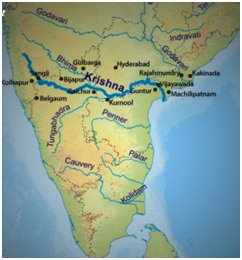

An ongoing jalajagadam (fight over water resources), once again drew the police forces of Andhra Pradesh and Telangana into a tense standoff at the common reservoirs of the two states.
Context
An ongoing jalajagadam (fight over water resources), once again drew the police forces of Andhra Pradesh and Telangana into a tense standoff at the common reservoirs of the two states.
About
About the water dispute between Andhra Pradesh and Telangana
- There are disagreements over the sharing of the Krishna river water between the two states.
- Andhra Pradesh concern: Andhra Pradesh alleges that Telangana has been drawing Krishna water from four projects — Jurala, Srisailam, NagarjunaSagar, and Pulichintala — for hydropower generation without approvals from the Krishna River Management Board (KRMB).
- KRMB is an autonomous body that was set up after the bifurcation of the state, to manage and regulate the waters in the Krishna basin.
- It is also accused that the water is used for power generation is being wasted by releasing it into the Bay of Bengal.
- Telangana’s concern: It has opposed the irrigation projects of the Andhra Pradesh government, especially the Rayalaseema Lift Irrigation Project (RLIP), which it claims is illegal.

Distribution of water between the two states
- The two states agreed to split the water share 66:34 on an ad hoc basis until the Krishna Water Disputes Tribunal-2 decided the final allocation.
- Telangana has called for a 50:50 allocation of water from the Krishna River.
How the river water disputes are resolved?
- In the case of Telangana, the 3 member dispute resolution committee could not arrive at any decision.
- Telangana wants the Krishna Water Disputes Tribunal-2 to permanently settle the water dispute; in the meantime.
- The Interstate River Water Disputes Act, 1956 (IRWD Act) is an act under Article 262 of the Constitution.
- Under the Act, a state government may request the central government to refer an inter-state river dispute to a Tribunal for adjudication.
- The Tribunal will consist of a Chairperson, Vice-Chairperson, three judicial members, and three expert members. They will be appointed by the central government on the recommendation of a Selection Committee.
- The Tribunal must give its decision within three years, which may be extended by two years.
- Under the Act, if the matter is again referred to the Tribunal by a state for further consideration, the Tribunal must submit its report to the central government within one year.
- This decision has the same force as that of an order of the Supreme Court.
|
KRISHNA WATER DISPUTES TRIBUNAL-II
|



